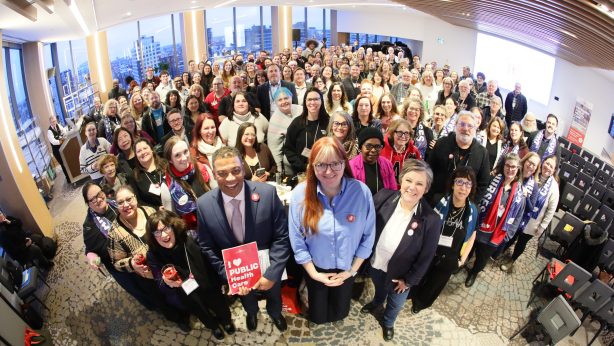Is your province waiting for a pharmacare deal?
Millions of Canadians could be benefiting from free contraceptives and diabetes treatments if only the federal government would negotiate funding deals with provinces and territories.
Instead, the Carney government seems to be backing away from its promise to protect the new pharmacare program, leaving a broken patchwork of eligibility across the country.
In order for you to benefit from this landmark expansion of Canadian Medicare, your province or territory has to enter into a pharmacare agreement with the federal government to receive funding, as authorized by the Pharmacare Act (Bill C-64 passed last October).
If you live in Manitoba, British Columbia, Prince Edward Island or Yukon – hooray! You will soon be covered by the new pharmacare program. If you are one of the four-out-of-five people outside those jurisdictions, “too bad, so sad.”
The federal Health Minister Marjorie Michel shocked plenty of people when out of the blue, she refused to commit to negotiating pharmacare deals with other provinces, despite many provincial health ministries saying they are ready to hammer something out with Ottawa.
The Hill Times’ reporter Tessie Sanci surveyed the provinces and territories and found plenty of ministries waiting for Ottawa to pick up the phone. Along with comments made to other journalists, we have compiled this list so that you can see where your province stands.
Status of pharmacare negotiations
British Columbia:
B.C. signed an agreement on March 6, 2025. B.C. was the first province in Canada to provide free contraception, and now it will expand public coverage to include free medication for diabetes and menopausal symptoms. B.C. residents can anticipate beginning to receive coverage for these products in March 2026, according to the government’s announcement.
Alberta:
Alberta has raised concerns about the design of the universal, single-payer system. Alberta’s Ministry of Primary and Preventative Health Services said in an August 11 email to the Hill Times that it “has made it clear that we would like to receive our share of federal funding to enhance Alberta’s existing comprehensive coverage, but we have not received a response.”
Saskatchewan:
An August 14 statement to the Hill Times from Saskatchewan’s Ministry of Health reads, “Any proposed national pharmacare program must be designed and implemented in partnership with our current provincial systems. While Saskatchewan has expressed a willingness to resume discussions about this with the federal government, there have been no negotiations scheduled.”
Manitoba:
Manitoba signed a pharmacare deal on February 27, 2025, making it the first jurisdiction to join the program. The agreement is similar to B.C.’s for contraceptives, diabetes treatments, and hormone replacement therapies. Manitoba residents can anticipate beginning to receive coverage for the majority of these products in June 2025, according to the government’s announcement.
Ontario:
Ontario says it has not received any details about Ottawa’s plans for a deal. “We remain prepared to work collaboratively with the federal government to reach a deal that benefits Ontario families,” a spokesperson for Ontario Health Minister Sylvia Jones wrote to the Toronto Star.
Quebec:
Quebec did not reply to the Hill Times, but has expressed their intention to opt out of pharmacare if it is enacted.
New Brunswick:
New Brunswick has held talks with the federal government, and Premier Susan Holt campaigned on a promise to sign a pharmacare deal to provide free contraceptives to residents. But talks seem to have stalled. “We have proposed that the federal government fund contraception access as a first step in advancing pharmacare in New Brunswick,” reads a government statement to the Hill Times. “This would align with our province’s upcoming initiative to provide free contraception, ensuring more equitable access to reproductive health services, and any additional federal funding being allocated to making our existing drugs plans more affordable for New Brunswickers.”
Nova Scotia:
An official with Nova Scotia’s Health Department told CBC the province wants to get back into negotiations with the federal government on a pharmacare agreement. “Health Canada is aware that we want to come back to the table for further discussions, so we’re waiting for that invite,” said Stacy Burgess, executive director of clinical care and delivery, to a government committee.
Prince Edward Island:
P.E.I. signed a deal with the federal government on March 7, 2025 to provide contraceptives and diabetes treatments to residents. At the time, the government announced that Islanders would begin to receive coverage for these products on May 1, 2025.
Newfoundland and Labrador:
Newfoundland and Labrador’s Department of Health and Community Services said that it “supports the federal government investing greater funding for medicare services, including pharmacare. … We have reached out to Health Canada staff to re-engage in these discussions, and look forward to working with them.” In an email on Aug. 15, the department informed the Hill Times that Health Canada has not yet responded to the outreach.
Yukon:
Yukon signed a pharmacare deal with Ottawa on March 20, 2025 – the eve of the federal election call. Territorial residents can anticipate beginning to receive coverage for these products no later than January 2026.
Northwest Territories:
The N.W.T. government said in an August 13 email to the Hill Times that the Northwest Territories “is open to discussions if the funding offered is sufficient to support programs that reflect the unique needs of N.W.T. residents and the realities of our healthcare service delivery. The current national pharmacare model does not adequately address these needs.”
The statement also said, “There has been no indication of available funding through a pharmacare agreement” and that “any future conversation should prioritize increased federal investment in health programs that are responsive to the distinct challenges and priorities of the Northwest Territories.”
Nunavut:
An August 13 statement by Nunavut’s Health Minister’s office said to the Hill Times, “At this time, the Government of Nunavut is not engaged in any active discussions” regarding pharmacare. “Nunavut is open to future discussions regarding a pharmacare agreement. Nunavut continues to reiterate that flexibility in funding agreements is pivotal to account for the distinct circumstances of the territory.”
The Canadian Health Coalition has asked for an urgent meeting with federal Health Minister Marjorie Michel to discuss progress on pharmacare, and to clarify why negotiations are not moving ahead with willing provinces and territories as prescribed by the Pharmacare Act.
I will keep this list updated, so check back regularly.



